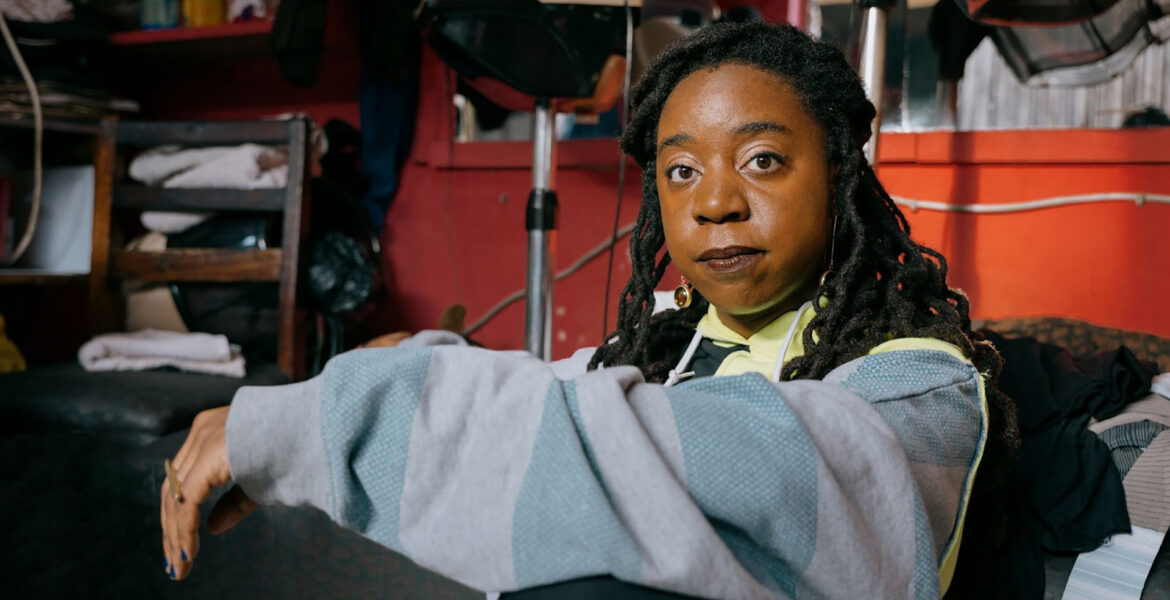Nikissi Serumaga has a different way of viewing things, usually, deciphering social-political themes, and addressing issues related to identity, culture, and historical narratives. The Ugandan filmmaker is in Kampala, working on a documentary and podcast series; Vintage or Violence, which explores the impact of second-hand clothing on countries like Uganda.
In her podcast series, Nikissi provides an extensive view of the world’s increasing obsession with clothing. And how countries like Uganda are paying the price for this insatiable hunger. The podcast explores the darker side of the fashion industry, highlighting its volatile impact on the local industry, the people and the environment.
“I’ve known second-hand clothing my whole life. As a kid, it was a site of embarrassment (we can’t afford our own clothes?), which I now know is ridiculous. In my teenage years and 20s, it was a site of opportunity (this brand for only this much? I’m buying!). Because of my work, now, every item is such an interesting potential rabbit hole into the geopolitics we are born into,” she says.
Vintage or Violence is set in Kampala, a documentary about Bobby Kolade, a designer who in 2018, decided to drop his burgeoning fashion career in Europe where he was working with notable brands like Maison Margiela and Balenciaga. For BUZIGAHILL, Bobby redesigns second-hand clothes and sells them back to the countries that originally discarded them, in the Global North.
When Nikissi and Bobby made a deeper research into the history of this second-hand trade, and how it plays out today. They realized that there was so much great content that wouldn’t make it into the film. When they saw an open call from HIVOS for projects, including podcasts, they decided to turn that research into the podcast, Vintage or Violence.
“Our podcast has inspired listeners to change their shopping and consumption habits, highlighting the significant impact of individual actions. Also, not to toot our own horn, we’ve seen several other new African artists and projects around the subject of second-hand clothing since we came out in 2021, and some of them have reached out to us.”
It is not surprising that such conversations are not Europe and America’s favourite headliners, and when they talk about it, the context is usually inverted. That’s why it was important for Nikissi to tell this from a Ugandan perspective, offering fresh, versatile content that is also accessible in various formats like social media, short videos, podcasts, art, interviews, and articles.
“It’s hyper-local yet super-pan African and still globally appealing. With a unique perspective that resonates worldwide, emphasizing that our narrative holds value for both local and global audiences,” she says.
“Internationally, not much is known about Kampala besides ‘Parte after Parte’ (which we love, ha!). But we thought it would be an interesting challenge to see how we can introduce people to Kampala that way, not just statistics and words. We also have to shout out the OGs, The Or Foundation, who were our research partners for this year’s podcast and website. They’ve been at it for 12 years, and when we started our research, they were one of a handful of resources we could find that looked at this issue from an African perspective.”
Nikissi believes that the feedback received from the podcast confirms people’s suspicions. She thinks that the Global North is suppressing African voices in various ways. However, expressing this idea without coming across as an angry old-school pan-Africanist or a conspiracy theorist is challenging. Prior to the podcast, people might have felt uneasy about the influx of clothing from around the world, but they were unsure of the harm it could cause or how it could offer avenues for survival. Nonetheless, everyone in the world wears clothes, and we all play a role in this narrative, whether as victims, victimizers, or an enabler of the tragedy. It’s uncertain whether we all understand our various roles in solving the problem, but Nikissi believes that the number of people who do understand is rapidly increasing, and that is a good thing for the earth.
“The challenge is that people don’t feel they have many alternative options, and I completely agree with that. A great quote from The Slow Factory reads: Everything we make returns to the Earth as food or poison. If we keep this in mind when purchasing what we need, what we want, and what is entirely unnecessary, I believe that it will naturally lead us to reduce excess and ask more questions about what we are consuming,” she says.
According to Nikissi, Bobby Kolade once gave her 10 items that she wore every day for six months. She says that wearing BUZIGAHILL clothes gave her a sense of confidence, comfort, and sexiness that she had never experienced before on a consistent basis. She loved it!
However, she also recalls having some BUZIGAHILL items bought directly off her back. Being fashion-conscious is not very easy, like many other things. And Nikissi has had trouble buying undergarments from first-hand/fast-fashion stores, and specialty items from either Owino or fast fashion as well, rain jackets and boots for example. “I’ve tried working with a tailor a few times, but it really wasn’t successful,” she says. But in all cases, she’s always trying to look for something that will be long-lasting.
While Nikissi is excited about producing this feature documentary Bobby’s journey to build a streetwear brand in Kampala. , her favorate part is following him around, and how that is strengthening their friendship. The documentary has received support from Sundance Documentary Fund and DW Akademie. On being asked about her favorite African artist, designer, and filmmaker, Nikissi admits, she finds it difficult to name favorites, however, she talks about the Arts Space: 32 Degrees East, which creates beautiful spaces for artists and makers to grow and connect. She also admires Bobby Kolade of BUZIGAHILL for his work as a designer. In terms of films, she mentions Felicite, which she finds surprisingly seductive, and Sacred Waters, which she praises for it’s openness and sensuality. Nikissi is looking forward to seeing her documentary on screens in the next few years, and so are we.
Listen to Vintage or Violence wherever you find your podcasts, and stay in touch with Nikissi via Instagram here.

